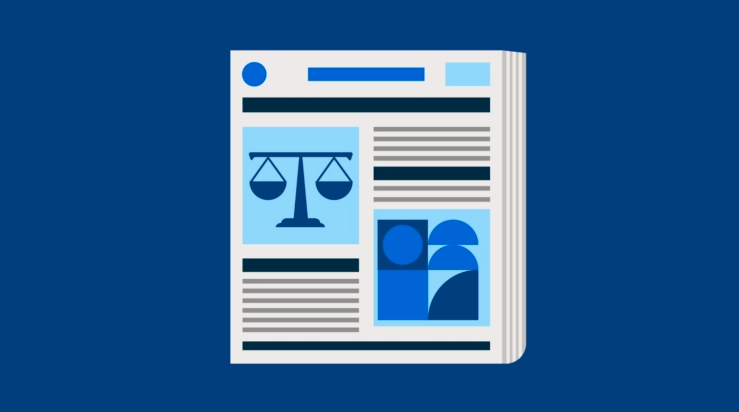Watching our on-demand virtual summit is a good starting point for learning about the role AI is playing in the legal profession. Since the release of ChatGPT, followed swiftly by other large language models (LLMs), we have been hearing about the predicted demise of the legal profession. However, since the appearance of ChatGPT, that view has changed, and the discussion has now moved to how AI can help lawyers in their daily work.
But where did this latest AI escalation come from? Below, we’ll introduce you to OpenAI, the artificial intelligence company that developed ChatGPT, along with the notorious chatbot and what its development means for the legal profession. And, if you’re hungry for more ChatGPT insights after reading this article, read our blog for the best ChatGPT prompts for solicitors.
Ready to see what AI actually means for your firm? Get the latest UK legal trends—straight from the source.
Download: The Future of Artificial Intelligence in the Legal Industry
What is OpenAI?
OpenAI is an artificial intelligence (AI) research and development company creating “highly autonomous systems that outperform humans at most economically valuable work.” The basic version of ChatGPT is free to use; however, paid versions provide more significant benefits.
What is ChatGPT?
ChatGPT is an AI-powered chatbot from OpenAI that responds to open-ended text queries with paragraphs of text-written answers. It was trained through reinforcement learning from human feedback. During this process, human AI trainers conversed as a user and an AI assistant, then ranked chatbot responses to teach the chatbot how to respond appropriately.
And, unsurprisingly, ChatGPT was just the beginning. On March 14, 2023, OpenAI launched GPT-4, which was trained using ChatGPT and lessons from their “adversarial training program.” This large, multimodal model not only accepts image inputs in addition to text but stands up to professional and academic benchmarks with human-level performance. For example, while ChatGPT scored in the bottom 10% when put to the test with a simulated bar exam, GPT-4 scored in the top 10% of test takers.
GPT-4o is currently available to the public free of charge but has limitations. Plus and Pro subscription models provide expanded services and allow for a research preview of GPT-4.5, the largest GPT model yet produced. You can also create images through text in GPT-4o. The original image from text generator Open AI’s DALL-E model, now named OpenArt, is now more advanced and has a free-to-use version.
How do you use ChatGPT?
ChatGPT is relatively simple to use—all you have to do is type in your request on the ChatGPT website or the WebChatGPT Chrome plugin. If you’re working from your phone, you can download the ChatGPT App from the Apple App Store or Google Play Store.
For instance, you can ask the tool to write a poem, answer a question in Shakespearean English, or solve complex math problems.
You’ll get a unique, surprisingly accurate answer from ChatGPT.
You may like these posts
How solicitors use ChatGPT
ChatGPT has transitioned from its initial research phase to being deployed in various applications and platforms. Advancements and improvements are always ongoing. This leaves legal professionals naturally asking: how can lawyers use ChatGPT?
While AI might not imminently replace lawyers, there’s no doubt that ChatGPT presents opportunities for law firms. From creating legal marketing content to drafting legal documents with the right prompts, the benefits of automating your legal writing with AI seem endless.
What’s more, law firms are already attempting to leverage ChatGPT technology to support legal clients. Take, for example, Harvey AI—an AI tool designed specifically for legal work that is already showing promising results. With these developments, it’s clear that AI has a role to play in the legal system—though what role that is exactly remains to be seen.

Challenges ChatGPT poses for solicitors
Beyond technical limitations, like using electronic devices in the courtroom, ChatGPT faces additional hurdles in the legal sphere.
For one, this technology is still in development. And, as eerily accurate as its responses may be, ChatGPT is not a human solicitor.
It’s also not always accurate—users have reported receiving incorrect information from the chatbot-in-training. ChatGPT initially only had access to information up to early 2022, which was partially responsible for inaccuracies, but now ChatGPT can access live data on the Internet. Further developments have led to Chat GPT being able to see, hear and speak.
Lacking the nuance necessary to create consistently accurate responses, let alone complex legal arguments, it’s safe to say that—at this stage, at least—ChatGPT is not in a position to replace solicitors.
Additionally, a solicitor’s ethical obligations will always take precedence over convenience.
Not only are there ethical considerations in using AI to argue your cases for you, but issues of security, client privacy, and privilege can also arise through the transmission of data between your firm and ChatGPT. As the chatbot stores personal and conversation data, solicitors must familiarise themselves with ChatGPT’s Privacy Policy and Terms of Use before using the service.
Embracing technology—responsibly—in your law firm
While we’ve highlighted some of the ethical hurdles of how solicitors can use ChatGPT in their law firm, we also know that enthusiastic adoption of technology positively affects a law firm’s business performance., The latest Legal Trends Report has disclosed that 96% of UK legal professionals have adopted AI somehow.Since the release of ChatGPT, more AI LLMs have been released, each vying to outdo the other.
Adopting technologies that streamline routine legal tasks, save time, and help you imprint your expertise on tasks that matter most is a win for any law firm. However, assessing and implementing technology responsibly is critical to ensure you’re meeting your ethical obligations and protecting your client’s interests.
Will AI replace solicitors? Final thoughts
Only time will tell what role AI tools like ChatGPT may—or may not—play in the legal profession.
Still, one thing’s for certain: adopting technology responsibly can help you save time managing your law firm and has a measurable impact on its performance.
While AI tools like ChatGPT have the potential to change the way lawyers work, that doesn’t mean that they will replace them. Solicitors may harness AI as a tool to help them work faster and more effectively—but they’ll still ultimately be responsible for completing legal work and practising law. With AI, tasks like e-discovery, drafting legal documents, and conducting due diligence can become less time-consuming, which can, in turn, free up a solicitor’s time to focus on legal work that requires a human touch.
Consider also how to get the most out of your technological investments—software like Clio comes with many tools, including client intake and payment processing. With over 100 integration partners, you can create a customised experience based on your firm’s unique needs.
Read more: A Lawyer’s Guide to Artificial Intelligence
We published this blog post in March 2025. Last updated: .
Categorized in: Clio, Technology
Explore AI insights in our latest report
Our latest Legal Trends Report explores the shifting attitudes toward AI in the legal profession and the opportunities it brings for law firm billing, marketing, and more.
Read the report





